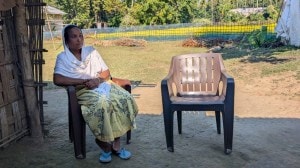Secularism as a dirty word
Katzenjammer is a word not commonly used because of its German provenance, but it sums up rather well the mood at a time when the Gujarat po...

Katzenjammer is a word not commonly used because of its German provenance, but it sums up rather well the mood at a time when the Gujarat pollquake has altered the political landscape and flattened many a cherished structure built with great deliberation over decades. 8216;Katzenjammer8217; means hangover, distress, depression. It also signifies confusion.
It8217;s not so much the Modi/BJP victory in Gujarat but the manner in which that victory was created that distresses. It8217;s is not so much the Congress defeat but the manner in which that defeat was fashioned that depresses.
History has proved time and again that Hate and Fear have been remarkably effective instruments in wresting power. Remember Rajiv Gandhi8217;s famous victory of December 1984, also gained after the riots that claimed some 3,000 Sikh lives, when he rode to power on lines like 8216;Will the country8217;s border finally be moved to your doorstep?8230; Why should you feel uncomfortable riding in a taxi driven by a taxi driver who belongs to another state?8217;
Of course, Modi/BJP went a step further this time. They succeeded in portraying the Opposition Congress as the Other, in regions where the We-They polarisation created by the riots had set in. It was helped by the politically constructed perception that 8216;They8217; were seamlessly linked to Kashmiri separatists, jehadi terrorism, Pakistani perfidy.
If I lose, said Narendra Modi on his gaurav trail, there will be celebratory fireworks in Pakistan. In other words, voting for the Congress amounted to a traitorous act.
The Congress had only itself to blame if it couldn8217;t come back on this. It had willingly conceded the battle for the mind long before it had begun. In fact, long before that even, right from the days when the March riots raged, the Congress was missing in action.
When it was required to defend the values it ostensibly stood for, it preferred to mouth vague pieties, shut its eyes and duck for cover. If it had done what it should have, it would also have had the confidence to question the gumption of the BJP in talking about security when it had so clearly failed to provide it as the ruling party at both the state and Centre.
It is difficult to believe that it was the cadres of the Congress that had once stood vigil on housetops to protect Muslim and Hindu mohallas from attack in days of the Partition, that it was the leaders of this party that had confronted the mobs and fasted for peace. In Gujarat, today, the Congress run over by Modi8217;s rath, wrung out by his wrath, has betrayed that legacy completely and totally.
Ironical as this may sound, the party could learn from Modi and his force multiplier, the VHP. They have demonstrated between them what reaching out to the people in a consistent fashion can do at the ground level and nothing demonstrates this more eloquently than the conspicuous success of the BJP in the tribal-adivasi belt of Gujarat 8212; a region that is contiguous with Madhya Pradesh. Over the last three years, the VHP8217;s Margdarshak Mandal has been extremely active here and today it has a presence in almost every village. Then again, look at the manner in which Modi made himself a household name, using every communication device, from the Diwali greeting card to the local newspaper, from the compact disc to the internet, from video to video-conferencing, to reach out to people, unremittingly, tirelessly, day after day.
It8217;s all very well to talk of Gujarat as a laboratory of Hindutva. But let8217;s not forget that such experimentation requires a great deal of time, energy, money and commitment. What has the Congress done in response, apart from flying in Sonia Gandhi from time to time, that is?
There is a larger point to be made here. We cannot expect good ideas, or good values, something we perceive as extremely valuable for the unity of the country, to travel by themselves. They have to become a felt need, they have to be internalised by people and become a part of their lives. Take the simple concept of 8216;secularism8217; that has been so vilified in recent times.
What, after all, is it but a fundamental idea to connect Indians 8212; no matter their cultural and religious diversity 8212; with each other? Why does Praveen Togadia reach for his trishul every time he hears the word 8216;secularism8217;? Because he is intelligent enough to understand that if his vision of a monolithic religion-based order is to succeed, the accommodative and inclusive vision of the country8217;s founding fathers will first have to be defeated.
Within hours of the BJP victory in Gujarat, he had declared that this was a vote against 8216;the pseudo-secularist ideology of Mahatma Gandhi and Nehru8217;. He went on to swear that his future exertions would be focused on getting the people of this country to reject this theory conclusively.
The worrying thing is that those who defend the idea of secularism 8212; and there are many in this country who would do so if they perceived the term without blinkers 8212; are clueless about how to take on the Modis and Togadias. Not just in terms of electoral strategies but, more importantly, at the level of civil society.
Yet it is vital they do so, especially because the interests of the politician and the citizen are not always the same. While the politician, often with the help of local mafia, may be tempted for the cynical purpose of winning power to drive a wedge between communities that have lived in peace for centuries; it is the citizen 8212; especially the poor and powerless 8212; that is left with the task of coping with the terrible consequences.
The rest of us, therefore, need to search for ways to rebuild the ground between extreme politics inspired by Hinduism, Islam, or any other ideology. This engagement, from all indications, is not a new phenomenon.
As political scientist Sunil Khilnani recently argued: 8216;From the late 19th century, all Indian thinkers and political figures faced a fundamental problem. How to discover or devise some coherent, shared norms 8212; values and commitments 8212; that could connect Indians together under modern conditions, that would define a public sphere for Indians?8217;
Gujarat demonstrates how important it is for India that this process continues.
- 01
- 02
- 03
- 04
- 05






























